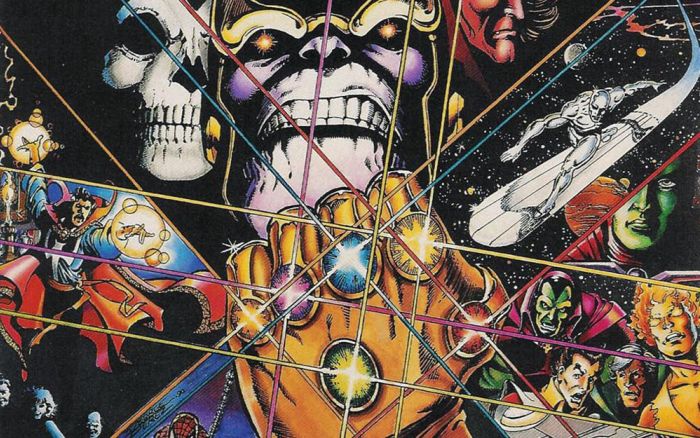Reading: Farewell Jon Stewart, American Horror Story, Marvel’s “Infinity Gauntlet” Saga, ISIS and American History, and Shamed on Social Media

Jon Stewart recently announced that he’s leaving The Daily Show, and Jamelle Bouie is “thrilled” to see him go. “[M]ost political conversations aren’t as shallow as the ones you see on TV. On op-ed pages and around dinner tables, Americans have substantive conversations about politics. And while the facts aren’t always right, the discussion is often valuable. Stewart gives short shrift to that kind of talk. Instead, in the world of The Daily Show, the only politics is cable politics, where venality rules, serious disputes are obscured, and cynicism is the only response that works.”
For all of its flaws, American Horror Story lets us explore a universe devoid of common grace. “This is the main strength of the horror genre, after all: it allows us to safely gaze upon the deepest depravity of human nature, and ponder the utter meaninglessness of a life where said depravity runs rampant. American Horror Story simply extends this to its logical conclusion, letting depravity loose for months at a time. To a mind accustomed to a universe awash in common grace, the result is often silly, frequently numbing, and — in flashes — brilliantly insightful.”

Tom Whitwell explains the process used to make every song sound the same these days. “When you turn on the radio, you might think music all sounds the same these days, then wonder if you’re just getting old. But you’re right, it does all sound the same. Every element of the recording process, from the first takes to the final tweaks, has been evolved with one simple aim: control. And that control often lies in the hands of a record company desperate to get their song on the radio.”
Crowdsourcing — harnessing the power of multitudes of people to solve complex problems — seems like a noble enterprise, but alas, pesky human nature always gets in the way. “Cebrian analyzed his (and other) crowdsourcing contests with the help of Victor Naroditskiy, a game theory expert at the University of Southampton. The results shocked him. ‘The expected outcome is for everyone to attack, regardless of how difficult an attack is,’ says Cebrian. ‘It is actually rational for the crowd to be malicious, especially in a competition environment. And I can’t think of any engineering or game theoretic or economic incentive to stop it.’ ” Pardon me for getting all theological, but once again, technology proves the reality of the Fall.

On io9, there’s a discussion about how the Marvel movies will adapt the “Infinity Gauntlet” saga (which, if you’ve been paying attention, they’re clearly leading up to). “We know that the Avengers: Infinity War movies will focus on Thanos and his quest for godlike power, an idea pulled straight from The Infinity Gauntlet limited series. What parts of Gauntlet will the MCU use, and what parts are too weird or confusing to make it to the screen?” Sadly, I doubt we’ll see, say, the Silver Surfer, the Living Tribunal, or any of Marvel’s other cosmic entities… though one can always dream.
How could I not link to this Kill Screen piece that combines Andrei Tarkovsky and video game design? “Within games there are the clockwork remnants of creation, and exploring a game’s edges can be an almost spiritual attempt to know its creators. When I first wondered how a game could adapt Nostalghia, I ignored the ways that games already have. The same conflicts of motivation, of doubt and belief, exist within game worlds. After all, once we have experienced all that a game’s designers intended, what keeps us playing? Why do we continue to inhabit solved worlds?”

Shortly after the Grammys, Kendrick Lamar dropped an incendiary new single titled “The Blacker the Berry” and Rembert Browne discusses the song’s import. “Kendrick is attempting a lot in one song. It’s an internal monologue, made public, in which he’s working out his own issues, acknowledging his own demons. Is it conservative? Is he coming down hard on black people? Is he coming down surprisingly hard on white people? Does he fully understand race and power and inequality as much as one perhaps should before jumping in this sea of generalizations? There are days and weeks and months and infinities left to parse out these ideas.”
While watching Jupiter Ascending, Matt Brown realized came to an important realization. “[W]atching the film, I was struck repeatedly by how little the best concept designers, pre-viz artists, and visual effects technicians apparently have to show me any more. Whole alien worlds, gravity boots over Chicago, a deep-dive into the Great Red Spot on Jupiter (a personal favourite astrological phenomenon since childhood, no less), and I never felt a second of amazement at any of it.” Have we reached, as he calls it, “peak visual effects”?

Rod Dreher’s recent piece on the similarities between ISIS’ atrocities and those committed in the American South less than a century ago doesn’t pull any punches, and thankfully so. “There was news today that brought to mind something that has been on my mind ever since the savages of ISIS burned that Jordanian pilot. That deed rightly horrified and disgusted us, just as the beheadings have done. But here’s the thing: ISIS is doing nothing that wasn’t widely done in the United States to black people until well within living memory.”
I was very pleasantly surprised to see Wired post this editorial advocating for adoption. “Parents so strongly desire a genetic relationship with their child that they are willing to go to great lengths in order to obtain it. And this, I think, is worrisome because the genetic relationship isn’t obviously good, and so prizing it so highly, at the cost of failing to promote other genuine goods, is a kind of moral distortion. Families are good, and familial relationships are among the greatest goods in life; but creating a genetic child isn’t necessary for these goods. Inviting a non-genetic child into one’s family isn’t less good, or less desirable, and there is a massive need for it.”

Alissa Wilkinson explains how she found community in a Facebook group. “[I]t was less like being in a room where everyone was yelling at one another and more like being gathered around one big dinner table, talking and laughing and having serious conversations about things that are important, like faith and racism and television and violence and art and theology. In a year in which it was often hard to find a place to talk about these things in an open, honest manner, I started to view the group as a place where I could go to sort out opinions without worrying about whether I’d be called a heretic or a lunatic or dismissed altogether.” I’m also a member of the group she’s talking about, and I couldn’t agree more.
Jon Ronson talks to people who’ve been publicly shamed on social media. “[F]or the past two years, I’ve been interviewing individuals like Justine Sacco: everyday people pilloried brutally, most often for posting some poorly considered joke on social media. Whenever possible, I have met them in person, to truly grasp the emotional toll at the other end of our screens. The people I met were mostly unemployed, fired for their transgressions, and they seemed broken somehow — deeply confused and traumatized.” I can’t recommend this enough; it’s excellent but deeply sobering.